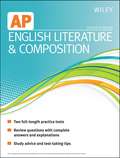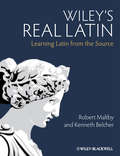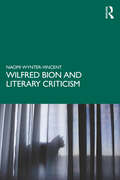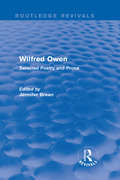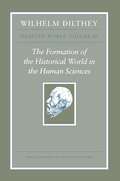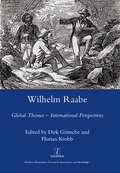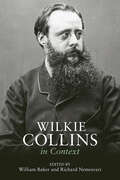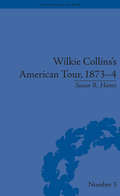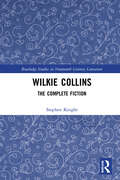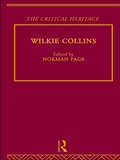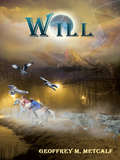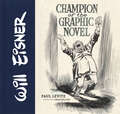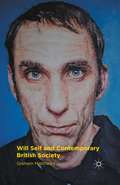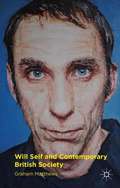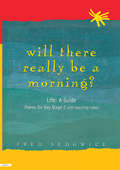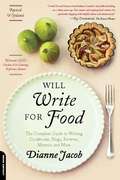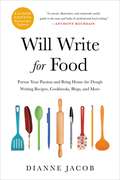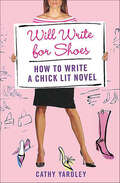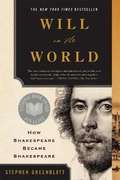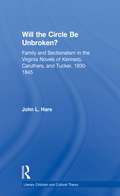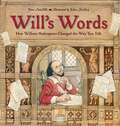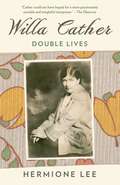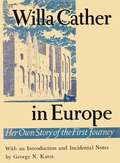- Table View
- List View
Wiley AP English Literature and Composition
by Geraldine WoodsScore your highest on exam dayRelax. The fact that you're even considering taking the AP English Literature & Composition exam means you're smart, hard-working, and ambitious. All you need is to get up to speed on the exam's topics and themes and take a couple of practice tests to get comfortable with its question formats and time limits. That's where Wiley AP English Literature & Composition comes in.This user-friendly and completely reliable guide helps you get the most out of any AP English class and reviews all of the topics emphasized on the test. It also provides two full-length practice exams, complete with detailed answer explanations and scoring guides. This powerful prep guide helps you practice and perfect all of the skills you need to get your best possible score. And, as a special bonus, you'll also get a handy primer to help you prepare for the test-taking experience.A detailed overview of the testSubject reviews covering all test topicsPractice questions Sample free-response questions with advice for crafting critical essaysStrategies and solid test-taking adviceTwo full-length practice tests with detailed explanations and walk-throughsSupplemented with handy lists of test-taking tips and more, Wiley AP English Literature & Composition helps you make exam day a very good day, indeed.
Wiley's Real Latin
by Robert Maltby Kenneth BelcherThis innovative guide to the Latin language, written for a new generation of students, deploys examples and translation exercises taken exclusively from the Classical Latin canon.Translation exercises use real Latin from a variety of sources, including political speeches, letters, history, poetry, and plays, and from a range of authors, including Julius Caesar, Cicero, Virgil, Catullus, Ovid, and Plautus, among othersOffers a variety of engaging, informative pedagogical features to help students practice and contextualize lessons in the main narrativePrepares students for immersion in the great works of Classical Latin literatureA companion website provides additional exercises and drills for students and teachers
Wilfred Bion and Literary Criticism
by Naomi Wynter-VincentWilfred Bion and Literary Criticism introduces the work of the British psychoanalyst, Wilfred Bion (1897–1979), and the immense potential of his ideas for thinking about literature, creative process, and creative writing. There is now renewed interest in Bion’s work following the publication of his Complete Works but the complexities of his theory and his distinctive style can be forbidding. Less well-known than Freud or Lacan, the work of Wilfred Bion nevertheless offers new insights for psychoanalytic literary criticism and creative writing. For newer readers of his work, this book offers an engaging introduction to several of Bion’s key ideas, including his theory of thinking (the ‘thought without a thinker’), the container/contained relationship, alpha-function; alpha-elements, beta-elements, and bizarre objects; K and -K; the Grid, O, and the caesura. It also offers a way in to Bion’s astonishing and challenging experimental work, A Memoir of the Future, and explores the impact of his devastating personal experiences as an officer during the First World War. Each chapter of Wilfred Bion and Literary Criticism draws on one or more specific aspects of Bion’s theory in relation to creative texts by Sigmund Freud, Stevie Smith, B.S. Johnson, Mary Butts, Jean Rhys, Nicholas Royle, J.G. Ballard, and Wilfred Bion himself. The first full-length study to explore the potential of Bion’s ideas for literary criticism, Wilfred Bion and Literary Criticism introduces his complex and extensive work for a new audience in an accessible and engaging way, and will be of great interest to scholars of creative writing, literary criticism, and psychoanalysis.
Wilfred Owen: Selected Poetry and Prose (Routledge Revivals)
by Jennifer BreenFirst published in 1988, this annotated selection of Wilfred Owen’s poetry and prose provides a comprehensive one-volume text of his best work. As well as the war poems, it includes illuminating early pieces such as ‘Impressionist’ and ‘Little Claus and Big Claus’, which illustrate Owen’s early command of satire and narrative. The prose includes Owen’s well-known draft Preface and a wide range of his letters, showing the devotion he felt for his mother, his poetic development after meeting Siegfried Sassoon, and, above all, his war experiences. With a detailed introduction and helpful commentary, this timely reissue will be of particular value to A-Level and undergraduate students with an interest in the work of Wilfred Owen, his contemporaries, and the context of the First World War.
Wilhelm Dilthey: The Formation of the Historical World in the Human Sciences
by Wilhelm DiltheyThis volume provides Dilthey's most mature and best formulation of his Critique of Historical Reason. It begins with three "Studies Toward the Foundation of the Human Sciences," in which Dilthey refashions Husserlian concepts to describe the basic structures of consciousness relevant to historical understanding.The volume next presents the major 1910 work The Formation of the Historical World in the Human Sciences. Here Dilthey considers the degree to which carriers of history--individuals, cultures, institutions, and communities--can be articulated as productive systems capable of generating value and meaning and of realizing purposes. Hegel's idea of objective spirit is reconceived in a more empirical form to designate the medium of commonality in which historical beings are immersed. Any universal claims about history need to be framed within the specific productive systems analyzed by the various human sciences. Dilthey's drafts for the Continuation of the Formation contain extensive discussions of the categories most important for our knowledge of historical life: meaning, value, purpose, time, and development. He also examines the contributions of autobiography to historical understanding and of biography to scientific history.The finest summary of Dilthey's views on hermeneutics can be found in "The Understanding of Other Persons and Their Manifestations of Life." Here, Dilthey differentiates understanding relative to three kinds of manifestations of life. After giving his analysis of elementary understanding, he examines the role of induction in higher understanding and interpretation, and the relevance of transposition and re-experiencing for grasping individuality.
Wilhelm Raabe: Global Themes - International Perspectives
by Dirk Göttsche Florian KrobbWilhelm Raabe (1831-1910) is one of the major figures of 19th-century German Realist writing, acknowledged as an innovator both stylistically and thematically. But until now there has been little concentration on the international and postcolonial dimensions of Raabe's work - his literary critique of colonialism, his engagement with modernization and globalization, his involvement in 19th century German discourses about America, Africa and Asia, and the links between international and national issues in his writing. In Raabe International, contributions from many eminent critics address Raabe both as a writer on world affairs and as a subject himself for translation and comment outside of Germany.
Wilkie Collins in Context (Literature in Context)
by William Baker Richard NemesvariThis collection of essays by international scholars celebrates the 200th anniversary of Wilkie Collins's birth by exploring his unconventional life alongside his works, critical responses to his writings and their afterlife, and the literary and cultural contexts which shaped his fiction. Topics discussed include gender, science and medicine, music, law, race and empire, media adaptations, neo-Victorianism, disability, and ethics. Along with an analysis of his novels, the essays included also recognize the importance of his short stories, journalism, and contributions to Victorian theatre, most notably illuminating the strong connections between sensation fiction and melodrama, as well as exploring his influence on film and TV. Engaging with yet also delving far beyond the famous novels, this volume promotes awareness of Collins' remarkable and diverse writerly achievements and paints a vivid portrait of an author whose fluctuating reputation among contemporary critics stands in stark contrast to his immense and still-enduring popularity.
Wilkie Collins's American Tour, 1873-4 (The History of the Book #3)
by Susan R HanesIn the autumn of 1873, Wilkie Collins followed the example of fellow literary celebrities Dickens and Thackeray, and began a six-month reading tour of America. This book places this tour within the American lyceum movement of the later nineteenth century.
Wilkie Collins: The Complete Fiction (Routledge Studies in Nineteenth Century Literature)
by Stephen KnightThis book provides the first comprehensive overview of the complete works of Wilkie Collins’s. Examining his vast array of novels and short stories, this volume includes analysis of the social, historical, and political commentary Collins offered within his works, illuminating Collins as more than a successful crime and sensation author, or the fortunate recipient of Dicken’s grand patronage, but as a hard-thinking and lively-writing part of the rich mid-Victorian literary scene. Overall, Collins is seen as a master of narratives which deal with social and personal issues that were much debated in his fifty-year authorial period. Close attention is paid to the events, themes, and characterization in his fiction, revealing his analytic vigor and the literary power of that period and context. Delivering fresh insight into the variety and richness of Collins’ themes and arguments, this volume provides a key source of information and analysis on all Collins’ fiction.
Wilkie Collins: The Critical Heritage (Critical Heritage Ser.)
by Norman PageFirst published in 1995. Routledge is an imprint of Taylor & Francis, an informa company.
Will
by Geoffrey M. MetcalfWill is a 9-year-old boy with cerebral palsy. He is a very bright and sensitive child but requires a walker to get around. We discover him playing game cube in his bedroom as the strange face of Elverness appears on the TV screen. Elverness tells Will he needs to go to Acquinistere to help defeat a great evil. Will is diffident and reluctant but agrees to try to help. Will is suddenly transported to a strange place with a yellow sky and blue sun. He discovers he can walk and run unassisted. He and Elverness are joined by two talking horses that transport them to a medieval type city. Yes, the story is derivative and very consistent with the genre. However, despite the ‘journey/quest’ elements, it is much more a ‘life lessons’ story.
Will Eisner: Champion of the Graphic Novel
by Paul LevitzA celebration of the life of the acclaimed comic book storyteller through his work as well as interviews with fellow creators.Will Eisner (1917–2005) is universally considered the master of comics storytelling, best known for The Spirit, his iconic newspaper comic strip, and A Contract With God, the first significant graphic novel. This seminal work from 1978 ushered in a new era of personal stories in comics form that touched every adult topic from mortality to religion and sexuality, forever changing the way writers and artists approached comics storytelling. Noted historian Paul Levitz celebrates Eisner by showcasing his most famous work alongside unpublished and rare materials from the family archives. Also included are original interviews with creators such as Jules Feiffer, Art Spiegelman, Scott McCloud, Jeff Smith, Denis Kitchen, and Neil Gaiman—all of whom knew Eisner and were inspired by his work to create their own graphic novels for a new generation of readers.NOTE: The cover is a high-quality photographic reproduction of Eisner's original art. The design intentionally reveals tape and other stray markings that are part of the artist's process and reflect the age of the artifact that was photographed.“Eisner was not only ahead of his times; the present times are still catching up to him,” —John Updike“What Will did was and is timeless,” —Neil Gaiman“Will Eisner is, and remains, one of my precious idols,” —Frank Miller"He was the greatest,” —Harvey Kurtzman“Will Eisner is a national treasure,” —Jules Feiffer“Will Eisner is the heart and mind of American comics,” —Scott McCloud“Eisner is the single person most responsible for giving comics its brains,” —Alan Moore“Eisner was unique in feeling from the start that comic books were not necessarily this despised, bastard, crappy, lowbrow kind of art form, and that there was a potential for real art,” —Michael Chabon
Will Self and Contemporary British Society
by G. MatthewsThis stimulating and comprehensive study of Will Self's work spans his entire career and offers insightful readings of all his fictional and non-fictional work up to and including his Booker prize nominated novel Umbrella.
Will Self and Contemporary British Society
by Graham MatthewsThis stimulating and comprehensive study of Will Self's work spans his entire career and offers insightful readings of all his fictional and non-fictional work up to and including his Booker prize nominated novel Umbrella.
Will There Really Be a Morning?: Life: A Guide - Poems for Key Stage 2 with Teaching Notes
by Fred SedgwickThis is a book about the power of poetry to speak about the central themes of what it is to be a human being. The first part is an anthology of specially selected poems. The second part provides detailed notes for teachers on how to use these poems in the classroom. The poems in the book are about morality: how we get on, or don't get on, with each other; how we feel when we are alone; the destruction of the world we live in; childhood; celebration; fear; death; and mystery. Sharing these poems helps us to understand ourselves, and to express ourselves. The poems are selected to help to break down the barriers between curriculum subjects, and to be especially useful for religious education and personal, social and moral education. There is a mixture of the classic, the traditional and the new here, but all of the selected poems show the true power of poetry to express feelings about things that matter.
Will Write for Food
by Dianne JacobThe success of Julie & Julia highlights the newest trend in food writing: blogging. Noted journalist and food-writing instructor Dianne Jacob has revised her award-winning book to include a chapter covering all the how-to’s of food blogging as well as updated resources and new information on working in other wildly popular genres, namely cookbooks and food memoirs. Incredibly timely, this new edition of Will Write for Food is the must-have for every foodie who wants to put pen to page--or hands to keyboard.
Will Write for Food: The Complete Guide to Writing Cookbooks, Blogs, Memoir, Recipes, and More
by Dianne JacobFor more than 15 years, writing coach, editor, and blogger Dianne Jacob has taught food lovers how to take their passion from the plate to the page. Now, Jacob has revised and updated her award-winning guide. Whether you've been writing for years or are just starting out, Will Write for Food offers what you need to know to succeed and thrive, including: - A new chapter dedicated to making an income from food writing - Updated information about self-publishing and cookbook production - Tips on creating and sustaining an irresistible blog with gorgeous photos - The keys to successful freelancing and reviewing - Advice from award-winning writers, editors, and agents - Engaging, fun writing exercises to get the juices flowing
Will Write for Food: The Complete Guide to Writing Cookbooks, Blogs, Reviews, Memoir, and More
by Dianne JacobThe success of Julie & Julia highlights the newest trend in food writing: blogging. Noted journalist and food-writing instructor Dianne Jacob has revised her award-winning book to include a chapter covering all the how-to's of food blogging as well as updated resources and new information on working in other wildly popular genres, namely cookbooks and food memoirs. Incredibly timely, this new edition of Will Write for Food is the must-have for every foodie who wants to put pen to page-or hands to keyboard.
Will Write for Shoes: How to Write a Chick Lit Novel
by Cathy Yardley* What is Chick Lit exactly?* How do I write a Chick Lit novel?* What are the steps I need to take to get published?Once dismissed as a fad by the popular press and literary community, the women's fiction genre called Chick Lit is now one of the hottest growing markets for new writers. In Will Write for Shoes, veteran Chick Lit and romance author Cathy Yardley addresses the common questions (and misconceptions) about the genre.Based on years of teaching about commercial women's fiction, this definitive guide provides invaluable tips and step-by-step methods for writing and selling a successful Chick Lit novel. Features include:* The history of Chick Lit* A blueprint for writing a Chick Lit novel* New trends in the genre* Tips and tools for breaking into the market* FAQs and miscellaneaA directory of agents and publishers who acquire Chick Lit, sample submission materials, and online resources make this fun and comprehensive manual a must-have for all women who want to write a Chick Lit novel.
Will in the World: How Shakespeare Became Shakespeare
by Stephen GreenblattHow does a young man from a small provincial town move to London in the late 1580s and in a remarkably short time, become the greatest playwright of all time?
Will the Circle Be Unbroken?: Family and Sectionalism in the Virginia Novels of Kennedy, Caruthers, and Tucker, 1830-1845 (Literary Criticism and Cultural Theory)
by John L. HareFirst published in 2002. This work examines eight Virginia novels against the background of the political and social concerns of the Jacksonian years in which they were written, arguing that the authors used familial processes as a metaphor to discuss issues that they regarded as critical. Each chapter focuses on a single novel - Swallow Barn, Kentuckian in New York, Cavaliers of Virginia, Horse-Shoe Robinson, George Balcombe, The Partisan Leader, and Knights of the Horseshoe - and examines its connections to the social and political tensions of the time of its publication - generational progress, sectional unity, executive authority, class relations, the nature of the ideal leader, relations among sections and states, socialist and perfectionist communities, and westward expansion.
Will the Wolf: Targeting the w Sound (Speech Bubbles 2)
by Melissa PalmerWill sits and watches the world go by, feeling all alone. Will he be alone forever? This picture book targets the /w/ sound and is part of Speech Bubbles 2, a series of picture books that target specific speech sounds within the story. The series can be used for children receiving speech therapy, for children who have a speech sound delay/disorder, or simply as an activity for children’s speech sound development and/or phonological awareness. They are ideal for use by parents, teachers or caregivers. Bright pictures and a fun story create an engaging activity perfect for sound awareness. Picture books are sold individually, or in a pack. There are currently two packs available – Speech Bubbles 1 and Speech Bubbles 2. Please see further titles in the series for stories targeting other speech sounds.
Will's Words: How William Shakespeare Changed the Way You Talk
by Jane SutcliffeWhen Jane Sutcliffe sets out to write a book about William Shakespeare and the Globe Theatre, in her own words, she runs into a problem: Will's words keep popping up all over the place! What's an author to do? After all, Will is responsible for such familiar phrases as "what's done is done" and "too much of a good thing." He even helped turn "household words" into household words. But, Jane embraces her dilemma, writing about Shakespeare, his plays, and his famous phrases with glee. After all, what better words are there to use to write about the greatest writer in the English language than his very own? As readers will discover, "the long and the short of it" is this: Will changed the English language forever. Backmatter includes an author&’s note, a bibliography, and a timeline.
Willa Cather
by Hermione LeeHermione Lee’s provocative and influential biography provides a sensitive reappraisal of a marvelous and often underrated writer. The Willa Cather she reveals here was a Nebraskan who spent much of her life in self-imposed exile from the prairies she celebrated in O Pioneers! and My Antonia, a woman whose life was riddled with the tension between masculine and feminine, and a writer whose naturalness of style disguised exquisite artistry. By exposing the contradictions that lie at the heart of much of Cather’s life and work, Lee locates new layers of meaning and places her firmly at the forefront of the modern literary tradition that was taking shape in her time.
Willa Cather In Europe: Her Own Story of the First Journey
by Willa CatherWilla Cather was twenty-eight years old in the summer of 1902 when she saw England and France for the first time. Behind her stretched the Nebraska fields of her childhood and still ahead of her the world as it belongs only to great writers. The 1902 journey, coming ten years before she made her literary mark withO Pioneers!, was unrepeatable, special in its effects on her artistic development. After disembarking at Liverpool, she toured the Shropshire country, got swallowed up by London, and then crossed the Channel to other skies—to Rouen, Paris, and the Riviera. These fourteen travel articles, written for a newspaper in Lincoln, Nebraska, and eventually collected and published in book form in 1956, are striking for first impressions colored by a future novelist's feeling for history and for beauty in unexpected forms.
